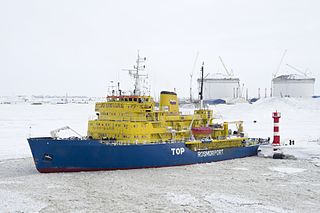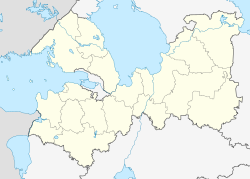
The Gulf of Ob, also known as the Bay of Ob, is a bay of the Arctic Ocean, located in northern Russia at the mouth of the Ob River. It is the world's longest estuary.

PJSC Gazprom is a Russian majority state-owned multinational energy corporation headquartered in the Lakhta Center in Saint Petersburg. The Gazprom name is a contraction of the Russian words gazovaya promyshlennost. In January 2022, Gazprom displaced Sberbank from the first place in the list of the largest company in Russia by market capitalization. In 2022, the company's revenue amounted to 8 trillion rubles.
The Sakhalin-2 project is an oil and gas development in Sakhalin Island, Russia. It includes development of the Piltun-Astokhskoye oil field and the Lunskoye natural gas field offshore Sakhalin Island in the Okhotsk Sea, and associated infrastructure onshore. The project is managed and operated by Sakhalin Energy Investment Company Ltd..

Polskie Górnictwo Naftowe i Gazownictwo S.A., abbreviated to PGNiG, was a Polish state-controlled oil and gas company, headquartered in Warsaw, Poland. The company has branches and representative offices in Russia, Pakistan, Belarus and Ukraine and holds equity interests in some 30 subsidiaries, including providers of specialist geophysical, drilling and well services.
Novatek is Russia's second-largest natural gas producer, and the seventh-largest publicly traded company globally by natural gas production volume. The company was originally known as OAO FIK Novafininvest. Novatek is based in the Yamalo-Nenets Autonomous Region in West Siberia, and maintains a head office in Moscow. In the 2020 Forbes Global 2000, Novatek was ranked as the 316th-largest public company in the world.

The petroleum or oil industry in Russia is one of the largest in the world. Russia has the largest reserves and was the largest exporter of natural gas. It has the sixth largest oil reserves, and is one of the largest producers of oil. It is the fourth largest energy user.
Baltic LNG is a liquefied natural gas plant under construction on the Gulf of Finland of the Baltic Sea in Ust-Luga, Leningrad Oblast, Russia. The plant's capacity would be 13 million tons of LNG per year. The planned launch date has changed many times, and according to the latest plans, the first line will start operating in 2024 and the second line in 2025. The cost of the project is estimated at 2.4 trillion rubles. On October 7, 2021, it was announced that the LNG plant might be expanded to three lines. The third line could be introduced by 2026, which would increase the plant's capacity to 20 million tons per year, reaching the capacity of Arctic LNG-2.

The Energy in Russia is an area of the national economy, science, and technology of the Russian Federation, encompassing energy resources, production, transmission, transformation, accumulation, distribution, and consumption of various types of energy.

Gunvor Group Ltd is a multinational energy commodities trading company registered in Cyprus, with its main trading office in Geneva, Switzerland. Gunvor also has trading offices in Singapore, Houston, Stamford, London, Calgary, and Dubai, with a network of representative offices around the globe. The company operates in the trade, transport, storage and optimization of petroleum and other energy products, as well as having investments in oil terminal and port facilities. Its operations consist of securing crude oil and petroleum products upstream and delivering it to market via pipelines and tankers. Gunvor has a separate company, Nyera, set up in 2021 to invest in renewable energy sources. It is run by energy transition director Fredrik Tornqvist.
The Baltic Pipeline System-2 is a second trunk line of the Baltic Pipeline System. The pipeline is constructed and operated by Russian oil pipeline company Transneft. The BPS-2 was completed in 2011 and began to function in late March 2012.

Ust-Luga Multimodal Complex is a project aimed at development of the portside area of about 3000 hectares located on the Soikinsky Peninsula by the Gulf of Finland in close proximity to the terminals of Ust-Luga Sea Merchant Port in Kingiseppsky District of Leningrad Oblast, Russia. The project developer is LLC "Multimodal complex Ust-Luga".

National Container Company was one of the biggest container operators in Russia and the CIS countries in the 2000s. The company was founded in 2002. Its container terminals were mainly based in the Baltic Sea. In 2012, the total capacity of the company’s maritime container ports was nearly 1.069 million TEUs. In 2013, NCC was acquired by Global Ports.
Yamal LNG is a joint venture led by Novatek based around a liquefied natural gas plant located in Sabetta at the north-east of the Yamal Peninsula, northwest Siberia, Russia. In addition to the LNG plant, the project includes production at the Yuzhno-Tambeyskoye gas field, and the transport infrastructure, including the Sabetta seaport and airport.

Sabetta is the location of a port and liquified natural gas (LNG) plant—Yamal LNG—on the Yamal Peninsula, in the north of Russia along the Northern Sea Route.

Fares Nikhadovich Kilzie is a Russian entrepreneur and Chairman of CREON Capital, Chairman the Board of Directors of Creon Energy.

The Russia–EU gas dispute flared up in March 2022 following the invasion of Ukraine on 24 February 2022. Russia and the major EU countries clashed over the issue of payment for natural gas pipelined to Europe by Russia's Gazprom, amidst sanctions on Russia that were expanded in response to Russia's 2022 invasion of Ukraine. In June, Gazprom claimed it was obliged to cut the flow of gas to Germany by more than half, as a result of such sanctions that prevented the Russian company from receiving its turbine component from Canada. On 26 September 2022, three of the four pipes of the Nord Stream 1 and 2 gas pipelines were sabotaged. This resulted in a record release of 115,000 tonnes of methane (CH4) – an equivalent of 15 million tonnes of carbon dioxide (CO2) – and is believed to have made a contribution to global warming.

The first plant, Sakhalin II, was completed in Russia in 2009 having utilised the skills of Shell plc, who under duress sold 50% of the project to Gazprom in 2006. Prior to 2017 Gazprom was the sole producer of Liquefied Natural Gas (LNG) in Russia.
Murmansk LNG is a liquefied natural gas plant being built by the Russian gas producer Novatek. It was approved on 10 October 2023 by Russian president Vladimir Putin and is scheduled to begin operation in 2027.















